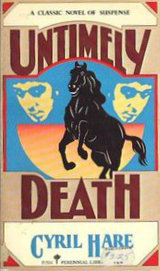
Darynda Jones hit the book market in 2011 with First Grave on the Right and gave paranormal and UF authors a bad case of author envy. Charley Davidson and Reyes Farrow are easily two of the most original characters in a long time. Ms Jones also hit the high notes for strong, well-developed prose, fast pacing that never feels rushed, and dual plots line – one is the plot that is the mystery in the book that is resolved within each book. The other is the over-arching plot about Charley herself and Reyes Farrow and just what they are to each other – and to the universe. And she does this with an odd mixture of humor, and horror, and mystery that shouldn’t work, but does so splendidly and with such verve, wit, and style it’s a delight to read.
In Fifth Grave Past the Light, Charley and the now released Reyes Farrow, are neighbors. And she wants to be a lot more, but how can the son of Satan and a Grim Reaper (actually a portal for souls – a kind of beacon and doorway for the dead to pass through to reach heaven) who is the daughter of light ever manage to get together?
It isn’t unusual for Charley to wake up and find ghosts in her apartment. After all, Mr Wong has been there the whole time. And not all ghosts are ready to pass. Not only can they see her, some are quite chatty. But having a ghost that stutters try and buy you a drink in your Dad’s bar? That’s awkward. Especially since it’s a cop bar and they tend to notice people talking to themselves. Even worse when your former high school BFF turned nemesis sits with her friends mocking you and making you feel 15 again. Hell had just come to Earth. Even worse, Charley was in her ‘available slut’ outfit trying to attract Marvin Tidwell, suspected cheating husband. Turns out, Marvin has a ‘type’, and Charley is NOT it. But Cookie, her zaftig secretary, BFF, and neighbor is. So Charley calls for reinforcements. A nervous Cookie seems to be doing so well, until Marvin spots the microphone and Cookie, scared, grabs for her gun. But Marvin manages to point the gun at Charley and time slows – as it always does for her – as she sees the bullet leave the barrel, tries to move, but can’t move fast enough and knows she’s about to die. Then Reyes is there, as he has been so many times in the past, and literally takes a bullet for her.
Oh, her apartment has a frightened young girl hiding under the bed who places 3 scratches down Charley’s face. And then there’s all these women, victims of a serial killer, so traumatized they can’t even help Charley find out what’s keeping them from passing thru to the light. And her sister has her going to see a psychologist for PTSD after what happened with Earl Walker – AND she told the psychologist Charley’s secret. And she needs Gerald Swopes’ help with doing background checks on Marvin – only the last time he helped her, he died and Reyes sent him to spend some quality time with Dad – AKA Lucifer. And a key and note from Reyes – “Use the key.” But does it open his apartment? Or something else?
Throw in a nurse who sees the future and visits Charley I spectral form yet has no memory of it, a police captain who wants to see just how Charley works to help her Uncle Bob have the highest clearance rate in the whole department, Cookie taking gun safety classes, the mother of her ghostly teenage assistant wanting to know why she keeps depositing $500 a month in her bank account. It’s a tough few days.
As always, despite the many threads in the story, the Darynda Jones not only manages to weave them all together into an engaging tale that moves at a breakneck pace, she brilliantly walks the line between laughs and a dark, grim reality – with one notable flaw, one that has cropped up in earlier books. The author has to introduce a lot of information, kind of a data dump, to move the over-riding story arc along. This isn’t easy, so she often has a character handle this in a single fell swoop toward the end of the book. This time she selected Swopes, and used his time with Satan as they way to get the information in. But suddenly Swopes has all these additional sources and the scene, a key one to the continuing story arc – get a very ‘deus ex machina’ feel to it. Of all the things that happened in the book, it was the one that seemed to not quite work. Maybe because I found the choice of character for the ‘big reveal’ didn’t quite fit. I think it might have worked had she introduced a different, new, enigmatic character to handle it with Swopes.
Fifth Grave Past the Light remains an excellent read and gets a A- (4.5*) from me, a very rare high rating. As a series, the Charley Davidson books are highly recommended reading for paranormal fans. This series should be read in order to follow the storyline.







In addition to the Charley Davidson series, I recommend, Kelly Gay’s Charlie Madigan series, Suzanne Johnson’s Sentinel’s of New Orleans series, Cecy Robson’s Weird Sisters series, and Kalayna Price’s Grave Witch series.















